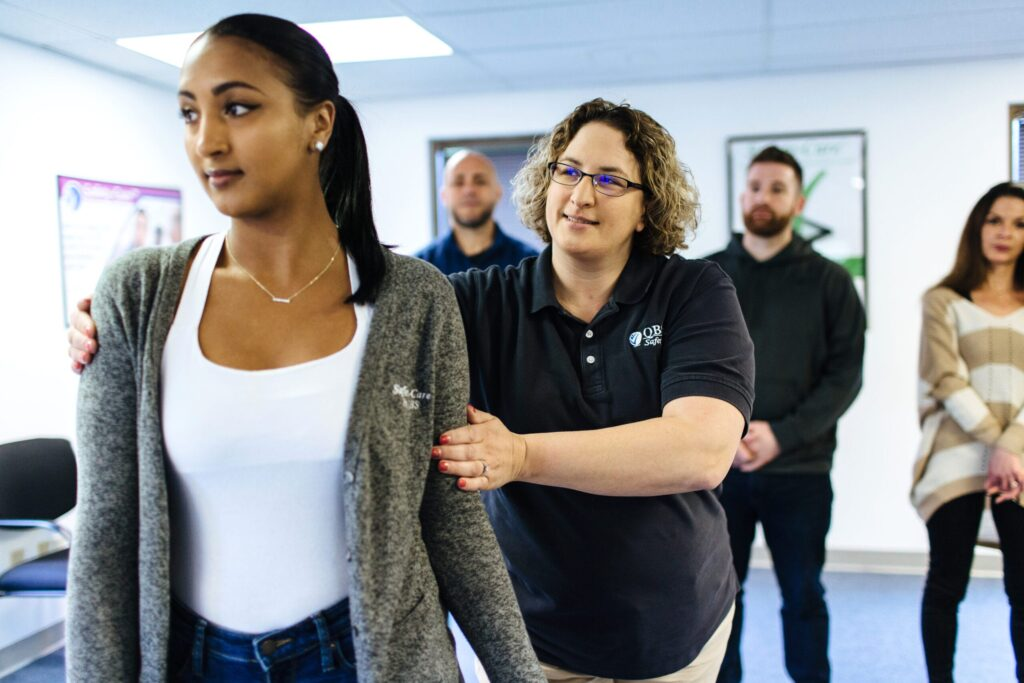District of Columbia – Dementia Training for Direct Care Workers
In October of 2020, the District of Columbia adopted new regulations regarding the training of direct care staff in facilities working with patients with Dementia. Below is a summary of these regulations along with how Safety-Care can be used to ensure that staff if best equipped and trained to support these patients.

.png?width=88&height=95&name=Group%20137%20(5).png)


How to Implement Safety-Care?
1. Register for a Safety-Care Trainer class or call us to request a closed session for your organization. We regularly conduct classes in all 50 states and Canada.
2. Complete your class to become a certified Safety-Care Trainer for your organization. We bring you to fluency using an errorless teaching methodology.
3. You train and certify your staff in Safety-Care’s effective techniques.
4. Our Master Trainers are available by phone, email, or video to help your organization with any questions or concerns while using or implementing Safety-Care.

Legal Requirements
|
Summary: Effective: October 20, 2020 Last Updated: December, 2024 In October of 2020, the District of Columbia adopted new regulations regarding the training of direct care staff in facilities working with patients with Dementia. Below is a summary of these regulations along with how Safety-Care can be used to ensure that staff if best equipped and trained to support these patients. How Safety-Care aligns: Numerous health organizations throughout the United States and Canada rely upon QBS and our Safety-Care training to provide their staff members with the training they need to help maintain a safe and healthy environment. Safety-Care provides a comprehensive, supportive approach to incident prevention, de-escalation, and management. Your Staff will learn practical strategies for helping students that use evidence-based practices consistent with PBIS (Positive Behavior Interventions and Supports) and ABA (Applied Behavior Analysis). |
|
(b)(1) Facilities and programs shall provide initial training of at least 8 hours to: (A) Alzheimer’s disease, and related dementia; (5) For other covered staff members, training shall include, at a minimum, an overview of dementia, principles of person-centered care, and communication issues |
|
(e)(1) A minimum of 4 hours of continuing education within each calendar year period shall be required for covered administrative staff members and covered direct service staff members. How Safety-Care aligns: Safety-Care is uniquely designed to provide trainees with the skills to assess potential crises, how de-escalate these situations, and how to respond if the situation is elevated. Our trainings are trauma-informed and focus on modifying behavior to prevent dangerous outcomes. Safety-Care can be taught to all levels of personnel, from administration down to volunteers. Additionally, our core trainings can be supplemented with unique add-on trainings focused on specific needs and professions. Safety-Care uses a Train the Trainer model allowing each district to quickly develop their own core of trainers qualified in the most current behavioral interventions and de-escalation strategies. Our Master Trainers can have up to ten (10) staff ready to train in as little as three days. Safety-Care is geared towards ensuring that all trainees are familiar with a single response system and can respond in-kind to numerous situations regardless of the professional setting. |
Why Safety-Care?
Benefits & Differentiators
In addition to Safety-Care being highly cost-effective, you get:

Skills to effectively prevent, minimize, & manage behavioral challenges with dignity, safety, & the possibility of change

Decreases in staff and patient injuries and reduction in restraint & seclusion time

Instructional procedures based on decades of evidence-based research & compatible with ABA, PBIS & reinforcement-based environments

Customizable program for your setting, staff & clientele, with a strong focus on preventative via non-intrusive, replacement behaviors

Extremely rigorous standards grounded in errorless teaching methodology

Small, intimate class sizes backed by unlimited support & resources
How Is Safety-Care So Effective?
A Genuine Focus on Implementing & Managing Positive Behavioral Skills
Proactive, environmental management recommendations
Understanding of evocative effects of staff behavior
In-depth analysis of antecedents and proactive antecedent interventions
Evidence-based reinforcement procedures
Required competency in de-escalation skills
Humane, non-invasive touch and QBS Check™ strategies
Evidence-based teaching procedures
Applicable to a wide array of settings, conditions & challenging behavior





